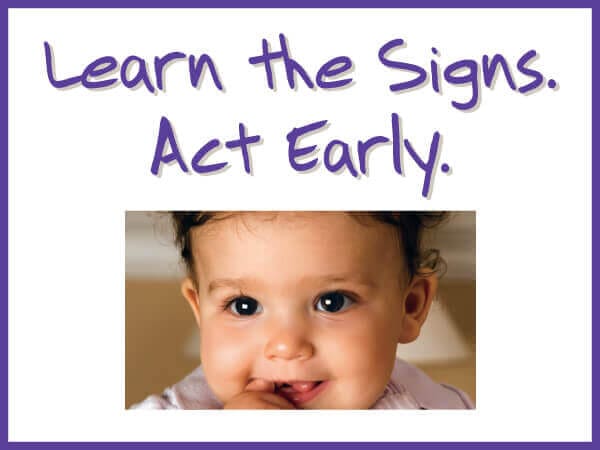VIDEO – Milestones Matter for Families
In this video, parents of young children share their personal experience using CDC’s “Learn the Signs. Act Early.” tools and resources to learn about child development, recognize the milestones their child should be reaching, and guide them about what to do if they ever become concerned.
Watch in English
Versión en Español
If You’re Concerned
As a parent, you know your child best. If your child is not meeting the milestones for their age, or if you think there could be a problem with the way your child plays, learns, speaks, acts, or moves, talk to your child’s doctor and share your concerns. Don’t wait. Acting early can make a real difference! Visit the Learn the Signs. Act Early. Families page for more resources and next steps.
Positive Parenting Tips

As a parent you give your children a good start in life—you nurture, protect and guide them. Parenting is a process that prepares your child for independence. As your child grows and develops, there are many things you can do to help your child. These links will help you learn more about your child’s development, positive parenting, safety, and health at each stage of your child’s life. Tap on the age of your child to see the milestones!
For more about your child’s development and great parenting advice and tips, visit the CDC “Learn the Signs, Act Early” website here.
Infant (0-1 Years)
Toddler (1-2 Years)
Toddler (2-3 Years)
Preschoolers (3-5 Years)
Infant (0 – 1 Years)
Developmental Milestones
Developmental milestones are things most children can do by a certain age. Children reach milestones in how they play, learn, speak, behave, and move (like crawling, walking, or jumping).
As your baby’s first teacher, you can help their learning and brain development. Try these simple tips and activities in a safe way. Talk with your baby’s doctor and teachers if you have questions or for more ideas on how to help your baby’s development.
Positive Parenting Tips
Click on the age below to see ways you can help your baby learn and grow:
2 Months

- Respond positively to your baby. Act excited, smile, and talk to them when they make sounds. This teaches them to take turns “talking” back and forth in conversation.
- Talk, read, and sing to your baby to help them develop and understand language.
- Spend time cuddling and holding your baby. This will help them feel safe and cared for. You will not spoil your baby by holding or responding to them.
- Feed only breast milk or formula to your baby. Babies are not ready for other foods, water or other drinks for about the first 6 months of life.
- Learn when your baby is hungry by looking for signs. Watch for signs of hunger such as putting hands to mouth, turning head toward breast/bottle, or smacking/licking lips.
- Look for signs your baby is full, such as closing their mouth or turning her head away from the breast/bottle. If your baby is not hungry, it’s ok to stop feeding.
- Have routines for sleeping and feeding. This will help your baby begin to learn what to expect.
For more tips and information about your baby’s development, please visit CDC’s website: https://www.cdc.gov/ncbddd/actearly/milestones/milestones-2mo.html#tips
4 Months

- Respond positively to your baby. Act excited, smile, and talk to them when they make sounds. This teaches them to take turns “talking” back and forth in conversation.
- Give your baby safe toys to play with that are easy to hold, like rattles or cloth books with colorful pictures for their age.
- Talk, read, and sing to your baby. This will help them learn to speak and understand words later.
- Feed only breast milk or formula to your baby. Babies are not ready for other foods, water or other drinks for about the first 6 months of life.
- Let your baby have time to move and interact with people and objects throughout the day. Try not to keep your baby in swings, strollers, or bouncy seats for too long.
- Set steady routines for sleeping and feeding.
- Lay your baby on their back and show them a bright-colored toy. Move the toy slowly from left to right and up and down to see if they watch how the toy moves.
For more tips and information about your baby’s development, please visit CDC’s website: https://www.cdc.gov/ncbddd/actearly/milestones/milestones-4mo.html
6 Months

- Use “back and forth” play with your baby. When your baby smiles, you smile; when they make sounds, you copy them. This helps them learn to be social.
- “Read” to your baby every day by looking at colorful pictures in magazines or books and talk about them. Respond to them when they babble and “read” too. For example, if they make sounds, say “Yes, that’s the doggy!”
- Point out new things to your baby and name them. For example, when on a walk, point out cars, trees, and animals.
- Put your baby on their tummy or back and put toys just out of reach.
- Talk with your baby’s doctor about when to start solid foods and what foods are choking risks. Breast milk or formula is still the most important source of “food” for your baby.
- Learn when your baby is hungry or full. Pointing to foods, opening their mouth to a spoon, or getting excited when seeing food are signs that they are hungry. Others, like pushing food away, closing their mouth, or turning their head away from food tells you that they have had enough.
- Hold your baby up while they sit. Let them look around and give them toys to look at while they learn to balance themself.
For more tips and information about your baby’s development, please visit CDC’s website: https://www.cdc.gov/ncbddd/actearly/milestones/milestones-6mo.html
9 Months
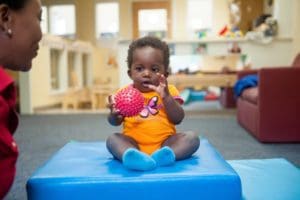
- Repeat your baby’s sounds and say simple words using those sounds. For example, if your baby says “bababa,” repeat “bababa,” then say “book.”
- Place toys on the ground or on a play mat a little out of reach and encourage your baby to crawl, scoot, or roll to get them. Celebrate when they reach them.
- Play games, such as peek-a-boo. You can cover your head with a cloth and see if your baby pulls it off.
- Play with your baby by dumping blocks from a container and putting them back in together.
- Find out about choking risks and safe foods to feed your baby. Let them practice feeding themselves with their fingers and use a cup with a small amount of water. Sit next to your baby and enjoy mealtime together. Expect spills. Learning is messy and fun!
- Ask for behaviors that you want. For example, instead of saying “don’t stand,” say “time to sit.”
- Help your baby get used to foods with different tastes and textures. Foods can be smooth, mashed, or finely chopped. Your baby might not like every food on the first try. Give them a chance to try foods again and again.
For more tips and information about your baby’s development, please visit CDC’s website: https://www.cdc.gov/ncbddd/actearly/milestones/milestones-9mo.html
Answer a few questions?
Toddler (1-2 Years)
Developmental Milestones
Developmental milestones are things most children can do by a certain age. Children reach milestones in how they play, learn, speak, behave, and move.
As your child’s first teacher, you can help their learning and brain development. Try these simple tips and activities in a safe way. Talk with your child’s doctor and teachers if you have questions or for more ideas on how to help your child’s development.
Positive Parenting Tips
Click on the age below to see ways you can help your baby learn and grow:
1 Year

- Teach your child “wanted behaviors.” Show them what to do and use positive words or give them hugs and kisses when they do it. For example, if they pull your pet’s tail, teach them how to pet gently and give them a hug when they do it.
- Build on what your child tries to say. If they say “ta,” say “Yes, a truck,” or if they say “truck,” say “Yes, that’s a big, blue truck.”
- Give your child safe places to explore. Baby-proof your home. For example, move sharp or breakable things out of reach. Lock away medicines, chemicals, and cleaning products. Save the Poison Help Line number, 800-222-1222, in all phones.
- Respond with words when your baby points. Babies point to ask for things. For example, say “You want the cup? Here is the cup. It’s your cup.” If they try to say “cup,” celebrate their attempt.
- Give your child water, breast milk, or plain milk as their main drink with meals and snacks. Offer water as well. Children do not need sugary beverages like fruit drinks, soda, sports drinks, or flavored milks. You do not even need to give your child juice, but if you do, only give 4 ounces or less a day of 100% fruit juice. Do not give your child other sugary beverages, such as fruit drinks, soda, sports drinks, or flavored milks.
- Help your child get used to foods with different tastes and textures. Foods can be smooth, mashed, or finely chopped. Your child might not like every food on the first try. Give your child a chance to try foods again and again.
- Give your baby pots and pans or a small musical instrument like a drum or cymbals. Encourage your baby to make noise.
For more tips and information about your baby’s development, please visit CDC’s website: https://www.cdc.gov/ncbddd/actearly/milestones/milestones-1yr.html
15 Months
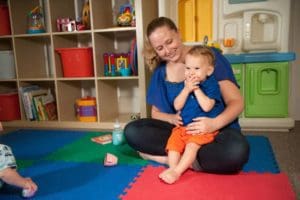
- Help your child learn to speak. A child’s early words are not complete. Repeat and add to what they say. They may say “ba” for ball and you can say “Ball, yes, that’s a ball.”
- Find ways to let your child help with everyday activities. Let them get their shoes to go outside, put the snacks in the bag for the park, or put the socks in the basket.
- Have steady routines for sleeping and feeding. Create a calm, quiet bedtime for your child. Put on their pajamas, brush their teeth, and read 1 or 2 books to them. Children between 1 and 2 years of age need 11 to 14 hours of sleep a day (including naps). Consistent sleep times make it easier!
- Say what you think your child is feeling (for example, sad, mad, frustrated, happy). Use your words, facial expressions, and voice to show what you think they are feeling. For example, say “You are frustrated because we can’t go outside, but you can’t hit. Let’s go look for an indoor game.”
- Expect tantrums. They are normal at this age and are more likely if your child is tired or hungry. Tantrums should become shorter and happen less as they get older. You can try a distraction, but it is ok to let them have the tantrum without doing anything. Give them some time to calm down and move on.
- Teach your child “wanted behaviors.” Show them what to do and use positive words or give them hugs and kisses when they do it. For example, if they pull your pet’s tail, teach them how to pet gently. Give them a hug when they do it.
- Let your child use a cup without a lid for drinking and practice eating with a spoon. Learning to eat and drink is messy but fun!
For more tips and information about your baby’s development, please visit CDC’s website: https://www.cdc.gov/ncbddd/actearly/milestones/milestones-15mo.html
1.5 Years (18 Months)
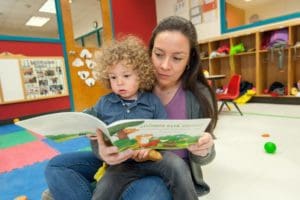
- Use positive words and give more attention to behaviors you want to see (“wanted behaviors”). For example, “Look how nicely you put the toy away.” Give less attention to those you don’t want to see.
- Encourage “pretend” play. Give your child a spoon so they can pretend to feed their stuffed animal. Take turns pretending.
- Let your child use a cup without a lid for drinking and practice eating with a spoon. Learning to eat and drink is messy but fun!
- Give simple choices. Let your child choose between two things. For example, when dressing, ask them if they want to wear the red or blue shirt.
- Have steady routines for sleeping and eating. For example, sit at the table with your child when they’re eating meals and snacks. This helps set mealtime routines for your family.
- Talk with your child by facing them and getting down to their eye level when possible. This helps your child “see” what you’re saying through your eyes and face, not just your words.
- Start to teach your child the names for body parts by pointing them out and saying things like “Here’s your nose, here’s my nose,” while pointing to their nose and your own.
For more tips and information about your baby’s development, please visit CDC’s website: https://www.cdc.gov/ncbddd/actearly/milestones/milestones-18mo.html
Answer a few questions?
Toddler (2-3 Years)
Developmental Milestones
Developmental milestones are things most children can do by a certain age. Children reach milestones in how they play, learn, speak, behave, and move.
As your child’s first teacher, you can help their learning and brain development. Try these simple tips and activities in a safe way. Talk with your child’s doctor and teachers if you have questions or for more ideas on how to help your child’s development.
Positive Parenting Tips
Click on the age below to see ways you can help your baby learn and grow:
2 Years

- Help your child learn how words sound, even if they can’t say them clearly yet. For example, if your child says, “or nana,” say “You want more banana.”
- Have your child help you get ready for mealtime, by letting them carry things to the table, such as plastic cups or napkins. Thank your child for helping.
- Give your child balls to kick, roll, and throw.
- Give toys that teach your child how to make things work and how to solve problems. For example, give them toys that they can push a button, and something happens.
- Allow your child to eat as much or as little as they want at each meal. Toddlers don’t always eat the same amount or type of food each day. Your job is to offer them healthy foods and it’s your child’s job to decide if and how much they need to eat.
- Use positive words when your child is being a good helper. Let them help with simple chores, such as putting toys or laundry in a basket.
- Let your child create simple art projects with you. Give your child crayons or put some finger paint on paper and let them explore by spreading it around and making dots. Hang it on the wall or refrigerator so your child can see it.
For more tips and information about your baby’s development, please visit CDC’s website: https://www.cdc.gov/ncbddd/actearly/milestones/milestones-2yr.html
2.5 Years (30 Months)

- Encourage “free play,” where your child can follow their interests, try new things, and use things in new ways.
- Give your child food choices that are simple and healthy. Let them choose what to eat from what you offer for a snack or what to wear. Limit choices to two or three.
- Help your child learn how to play with other children. Show them how by helping them share, take turns, and use their “words.”
- Let your child “draw” with crayons on paper, shaving cream on a tray, or chalk on a sidewalk. If you draw a straight line, see if they will copy you. When they get good at lines, show them how to draw a circle.
- Let your child play with other children, such as at a park or library. Ask about local play groups and pre-school programs. Playing with others helps them learn the value of sharing and friendship.
- Eat family meals together as much as you can. Give the same meal to everyone. Enjoy each other’s company and avoid screen time (TV, tablets, and phones, etc.) during meals.
- Allow your child to eat as much or as little as they want at each meal. Your job is to offer them healthy foods and it’s your child’s job to decide if and how much they want to eat.
For more tips and information about your baby’s development, please visit CDC’s website: https://www.cdc.gov/ncbddd/actearly/milestones/milestones-30mo.html
Answer a few questions?
Preschoolers (3-5 Years)
Developmental Milestones
Developmental milestones are things most children can do by a certain age. Children reach milestones in how they play, learn, speak, behave, and move.
As your child’s first teacher, you can help their learning and brain development. Try these simple tips and activities in a safe way. Talk with your child’s doctor and teachers if you have questions or for more ideas on how to help your child’s development.
Positive Parenting Tips
Click on the age below to see ways you can help your baby learn and grow:
3 Years
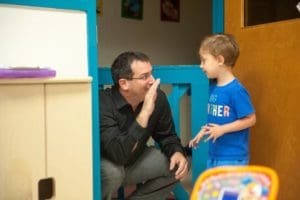
- Encourage your child to solve their own problems with your support. Ask questions to help them understand the problem. Help them think of solutions, try one out, and try more if needed.
- Talk about your child’s emotions and give them words to help them explain how they’re feeling. Help your child manage stressful feelings by teaching them to take deep breaths, hug a favorite toy, or go to a quiet, safe place when they are upset.
- Read with your child. Ask questions, such as “What is happening in the picture?” and/or “What do you think will happen next?” When they give you an answer, ask for more details.
- Play counting games. Count body parts, stairs, and other things you use or see every day. Children this age are starting to learn about numbers and counting.
- Let your child help with making meals. Give them simple tasks, such as washing fruits and vegetables or stirring.
- Limit screen time (TV, tablets, phones, etc.) to no more than 1 hour per day of a children’s program with an adult present. Don’t put any screens in your child’s bedroom. Children learn by talking, playing, and interacting with others.
- Give your child an “activity box” with paper, crayons, and coloring books. Color and draw lines and shapes with your child.
For more tips and information about your baby’s development, please visit CDC’s website: https://www.cdc.gov/ncbddd/actearly/milestones/milestones-3yr.html
4 Years

- Read with your child. Ask them what’s happening in the story and what they think might happen next.
- Help your child learn about colors, shapes, and sizes. For example, ask the color, shapes, and size of things they see during the day.
- Encourage your child to use “their words” to ask for things and solve problems but show them how. They may not know the words they need. For example, help your child say, “Can I have a turn?” instead of taking something from someone.
- Help your child learn about others’ feelings, and about positive ways to react. For example, when they see a child who is sad, say “He looks sad. Let’s bring him a teddy.”
- Tell your child in a simple way why they can’t do something you don’t want them to do (“unwanted behavior”). Give them a choice of what they can do instead. For example, “You can’t jump on the bed. Do you want to go outside and play or put on some music and dance?”
- Let your child play with other children, such as at a park or library. Ask about local play groups and pre-school programs. Playing with others helps your child learn the value of sharing and friendship.
- Eat meals with your child when possible. Let them see you enjoying healthy foods, such as fruits, vegetables, and whole grains, and drinking milk or water.
- Give your child toys or things that encourage their imagination, such as dress-up clothes, pots and pans to pretend cook, or blocks to build with. Join them in pretend play, such as eating the pretend food they cook.
For more tips and information about your baby’s development, please visit CDC’s website: https://www.cdc.gov/ncbddd/actearly/milestones/milestones-4yr.html
5 Years

- Your child might start to “talk back” in order to feel independent and test what happens. Limit the attention you give to the negative words. Find alternative activities for them to do that allow them to take the lead and be independent. Make a point of noticing good behavior. “You stayed calm when I told you it’s bedtime.”
- Play with toys that encourage your child to put things together, such as puzzles and building blocks.
- Use words to help your child begin to understand time. For example, sing songs about the days of the week and let them know what day it is. Use words about time, such as today, tomorrow, and yesterday.
- Let your child do things for themself, even if they don’t do it perfectly. For example, let them make their bed, button their shirt, or pour water into a cup. Celebrate when they do it and try not to “fix” anything you don’t have to.
- Talk about and label your child’s and your own feelings. Read books and talk about the feelings characters have and why they have them.
- Eat meals with your child and enjoy family time talking together. Give the same meal to everyone. Avoid screen time (TV, tablets, phones, etc.) during mealtime. Let your child help prepare the healthy foods and enjoy them together.
- Encourage your child to “read” by looking at the pictures and telling the story.
For more tips and information about your baby’s development, please visit CDC’s website: https://www.cdc.gov/ncbddd/actearly/milestones/milestones-5yr.html

